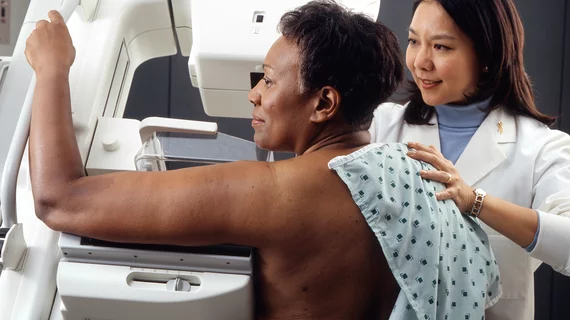Lower-income individuals often face a number of socioeconomic factors preventing them from completing breast cancer screening exams, including transportation and work issues. But Massachusetts General Hospital providers may have come up with a plan to ensure these patients receive the care they need.
Their pilot study, detailed in the January issue of the Annals of Family Medicine, involves performing mammograms when patients are first admitted to the hospital. National and local data both indicate that women covered under both Medicaid and Medicare have low rates of breast screening.
Screening these dual-eligible patients in the inpatient setting, however, proved not only to be feasible, but successfully targeted those who would likely have not, or never had, undergone a mammogram.
“We designed the study to reach the patients who face significant barriers to completing their mammograms in the outpatient setting," first author Andrew S. Hwang, MD, MPH, an internist at MGH, said in a statement. “This targeted strategy has the potential to reduce disparities in cancer screening rates by addressing patients' acute medical needs and their preventive care needs simultaneously."
For their research, Hwang and colleagues included Medicaid and dual-eligible women admitted to an MGH General Medicine institution between March 2019 and 2020. Each patient was overdue for their mammogram and had an MGH-affiliated primary care physician responsible for following up on abnormal results.
In total, 21 women were deemed appropriate candidates for an inpatient exam, with 17 successfully completing their mammogram. The other four were discharged. And of those 17 patients, 35% had never received a mammogram, while the others were overdue for their exam by an average of four years.
All scans were negative, with one requiring further testing to rule out cancer. Importantly, undergoing their breast exam didn’t increase the patients’ hospital length of stay.
The team hopes to offer inpatient breast screening to individuals admitted to other areas of the hospital and plan to perform additional preventative testing, such as colorectal cancer screening and fecal immunochemical testing for low-income patients.
“In addition, as our healthcare system transitions from fee-for-service to value-based payment models, improving health outcomes among underserved patient populations will become increasingly important,” Hwang explained. “Completing preventive screening tests, such as mammograms, during hospitalizations can be one way to help patients who might otherwise miss preventive care."

